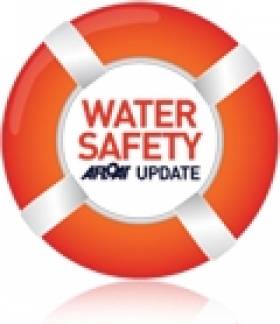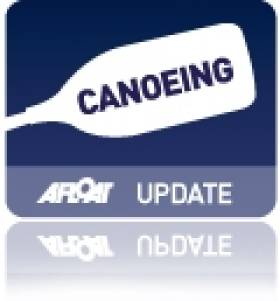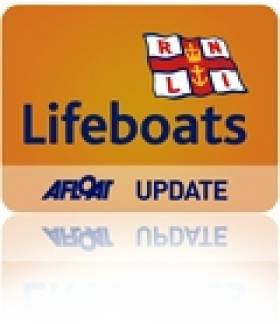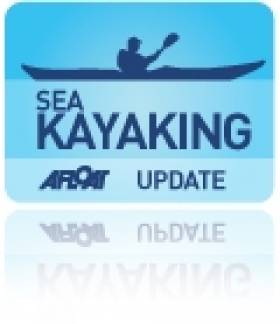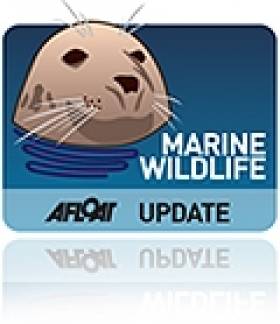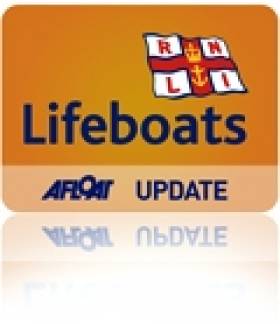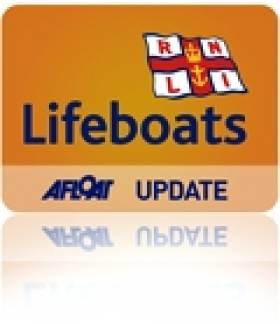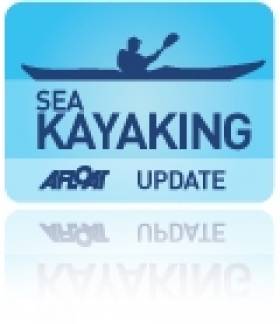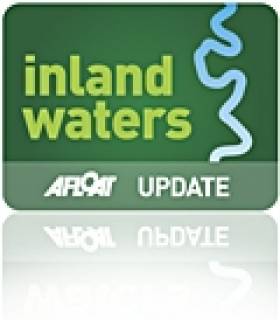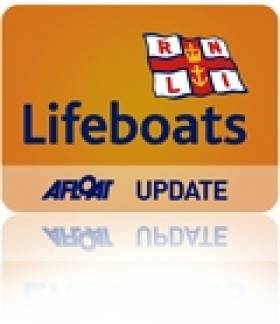Displaying items by tag: Kayaking
Video: RNLI Gives Top Help Tips For Kayakers
#WaterSafety - The RNLI has posted the above video outlining what kayakers can do to call for help if they get into difficulty on the water.
Taking a whistle along for the trip is one sensible idea, as is ensuring a means of longer-range communication such as a VHF radio or a mobile phone in a dry case.
Carrying a flare may also prove handy, and there's always that old standby if other water users are within earshot - shouting as loud as you can to attract attention.
Urban Kayaking Could 'Inject Colour And Life Into The Liffey'
#Kayaking - Kayaking in the capital will bring the Liffey "back to life", according to one enterprising watersport fan.
The Irish Independent reports on City Kayaking, a business operated from the IFSC in Dublin's Docklands by Donnchadh MacCobb, who's hoping to secure funding from the Arthur Guinness Projects initiative to expand his base and attract more people to the experience of kayaking through the city centre.
"We’ll let people explore underneath some of Dublin’s most famous bridges and take in some of the most iconic landmarks while paddling along the River Liffey," he says.
Keeping with the padding theme, the Sunday Independent's Fiona O'Connell headed waterside to see the Thomastown Paddlers' Annual Canoe Race.
The Kilkenny-based club is also in the running for funding via the Arthur Guinness Projects, with the hope of purchasing new strength and fitness equipment to take its members to the next level.
RNLI Lifeboat Rescues Stranded Kayaker Off Youghal
#RNLI - Youghal RNLI launched yesterday afternoon (5 August) to a report of an object in the water off Redbarn Strand at Youghal - and picked up a stranded kayaker instead.
The volunteer crew was requested to launch their inshore lifeboat at 2.30pm when a member of the public raised the alarm after spotting something in the water.
The lifeboat, helmed by David Slattery with crew members Martin Morris and Joe Moore on board, located the object minutes after launch. It turned out to be a large human hamster ball that apparently had blown into the water from the strand.
While the crew were taking the ball on board, they spotted a lone male kayaker 50 yards away who had lost his paddle and proceeded to his aid.
The kayaker told the lifeboat crew that he had lost his paddle and was drifting for some time. He was very tired after attempting to paddle with his hands and did not have a spare paddle or any form of communication or flares.
Weather conditions at the time were sunny with a moderate to fresh northerly breeze and a one-metre swell.
The lifeboat took the man and his kayak on board and proceeded back to the Youghal lifeboat station, where they checked if he was in need of any medical attention.
Youghal RNLI lifeboat press officer Noreen Varney said: “It was a very fortunate set of circumstances for the kayaker to be rescued from what originally was a non-related incident.”
Derry-Born Surf Kayak World Champ Gets Congrats From Home
#Kayaking - Derry Mayor Martin Reilly offered his congratulations to native son Jake King on taking the surf kayak world title in Australia earlier this month.
As the Derry Journal reports, 18-year-old King was crowned champion after topping three other reigning top dogs in the men's longboat, masters and junior short boat in the final of the competition at Maroochydore beach in Queensland.
According to his father Paddy, Jake King can now add his name to the list of five previous world champions from the Canoe Association of Northern Ireland (CANI) surf kayak club - which includes his brother Corin.
In other kayaking news, a London paddler has broken the record for circumnavigating the Isle of Man in the Irish Sea.
BBC News reports on the feat achieved by 39-year-old George Shaw, who completed the 115km route around the island in 11 hours 43 minutes - smashing the previous record by almost an hour.
Video Shows Kayaker's Close Encounter With Basking Shark
#MarineWildlife - An angling kayaker has spoken of his surprise at being "stalked" by a basking shark off Donegal.
The Irish Times yesterday posted video of the close encounter captured by Graham Smith while paddling along the coast.
As Smith told the Irish Independent, he was only hoping to catch a tope shark when he came upon a school of basking sharks off the Inishowen Peninsula.
And when one of them started following him, Smith went into panic mode - but soon realised the shark was more interested in the slipstream of his kayak, which provided a steady source of plankton for the giant filter feeder.
The second biggest fish in the sea after the whale shark, basking sharks are now a regular sight in Irish waters, with protections on the endangered species resulting in a boom in numbers.
Skerries Lifeboat Rescues Colt Island Kayakers
#RNLI - Skerries RNLI rescued a group of teenagers who got into difficulty while kayaking on Sunday evening (30 June).
The volunteer crew launched their inshore lifeboat shortly after 6pm to reports of a group of kayakers on Colt Island who were unable to return to shore due to the deteriorating weather conditions.
Skerries RNLI lifeboat operations manager Niall McGrotty paged the crew after receiving information from a retired crew member that there was a group of kayakers stranded on Colt Island.
The lifeboat was helmed by Joe May and had crew members Philip Ferguson, David Knight and Adam Scott on board. Weather conditions at the time were a force five to six northerly wind and choppy seas.
Arriving on scene three minutes after launching, the lifeboat found 11 teenage boys with five kayaks sheltering on Colt Island, as they were unable to return to shore against the increasing wind and waves.
All 11 boys were taken on board the lifeboat and the five kayaks were taken in tow. The lifeboat towed the kayaks back to the slipway at the station where the volunteer shore crew recovered them. The lifeboat then brought the teenagers safely back to the harbour.
Speaking after the call-out, Skerries RNLI helm Joe May said: "The boys did the right thing in staying together, staying on the island and raising the alarm. If they had tried to make it back to shore we could have been dealing with a much more serious situation.
"Our volunteer crew are always ready to respond to any emergency and we were happy to bring everyone safely home."
Skerries RNLI Responds To Concerns Over Shore Walkers
#RNLI - Skerries RNLI in North Co Dublin were requested to launch by the Irish Coast Guard on Monday evening (24 June) following a call from a concerned member of the public regarding a group of people walking back to shore from Shenick Island.
The volunteer lifeboat crew launched their inshore lifeboat Louis Simson shortly before 9pm and proceeded directly to scene.
The caller had reported that the group were attempting to walk ashore from the island and were already in water up to their waists. However, shortly after arriving on scene, communication was received from Skerries Coastguard that the people in question had made it safely to shore.
Before returning to base, Skerries also requested the lifeboat to check on another group of people who were on the shoreline of Colt Island. This turned out to be a group of kayakers who were simply having a rest so the lifeboat was stood down and returned to station.
Speaking afterwards, Skerries RNLI volunteer lifeboat press officer Gerry Canning said: "It’s not unusual for people to get caught out by the quickly rising tide. We would encourage people to check the tide tables and always allow plenty of time to get to where you are going safely."
In related news, an updated and interactive edition of the RNLI’s safety handbook Sea Safety: The Complete Guide is now available free online.
The Complete Guide is the RNLI’s handbook of essential information for all those who go to sea. Its new interactive format – including videos, quizzes and challenges - means that sea safety is available on mobiles, tablets and laptops and at the tip of boaters’ fingertips.
RNLI coastal safety manager Tony Wafer said: "The Complete Guide gives more in-depth advice on how to follow these principles and stay safe on the water. It’ll cover everything from how to plan your time on the water, what safety equipment to take and how to use it, and what to do in an emergency."
#Kayaking - Red Bull recently caught up with sea kayaking adventurer Justine Curgenven, who is currently over a month and more than half way into her 1,000-mile circumnavigation of Ireland.
Unlike Elaine 'Shooter' Alexander's epic solo voyage two years ago, the New Zealander has some extra paddle power in the form of her partner Barry Shaw and friend Roger Chandler.
"We aren't going for any speed records, just hoping to enjoy the scenery and meet some local people," she says of their 50-day adventure around Ireland.
But that's not to say our waters aren't challenge for this experienced kayaker.
"Irish waters can be very challenging," says Curgenven. "They get 2-3m swells quite regularly and are known for their surf beaches, which we are trying to avoid!"
Despite the hard work, the film-maker says "time really does fly when you're having fun... If you like circumnavigations then it's really a great island to paddle around."
Red Bull has more on the story HERE.
#InlandWaterways - Waterways Ireland is advising masters and users of the Shannon Navigation that a triathlon event will take place on Saturday 8 June in the environs of Portrunny Harbour.
The swimming course will be laid out adjacent to the moorings in the harbour, and will be active from 11.30am till 1pm on the day.
Swimmers on the course will be accompanied by a safety boat and kayaks.
Masters are requested to give the swimmers a wide berth and to navigate at slow speed and with a low wash when passing the area, and to heed any instructions or advice given by the event marshals.
Station To Station Challenge Raises More Than €2,000 For RNLI
#RNLI - Two men who embarked on the first RNLI Station to Station challenge between Bundoran and Arranmore last Saturday (6 April) completed the job in just under 12 hours - raising over €2,000 for both lifeboat stations in the process.
As per their plan reported previously on Afloat.ie, Niall Clancy and James McIntyre both set off from Bundoran Lifeboat Station just after 6am on Saturday morning – Clancy running and McIntyre cycling.
Clancy's route took him through Bundoran, Ballyshannon, Donegal town, Mountcharles, Frosses, Glenties, Gweebarra Bridge, Lettermacaward, Dungloe, Burtonport and finally Arranmore Island via a treadmill on the ferry!
He was joined on various legs of the journey by members of the Tir Chonaill Athletic Club who kept his spirits up on the 100km journey from station to station.
Meanwhile, McIntyre and his team from Mullaghmore Triathlon Club and Donegal Bay Cycling Club took off at the same time cycling as far as Lough Eske, where James then made the lonesome journey himself across the Bluestack Mountains, constantly keeping organisers informed of his progress via text message.
Down into Glenties and from there by bike to Portnoo where, with Bundoran RNLI crewman Killian O’Kelly, he kayaked the remaining 22km to Arranmore Island, where both he and Clancy were greeted by the lifeboat crew and the Arranmore Pipe Band.
Speaking on completion of the challenge at Arranmore RNLI Lifeboat Station, Clancy said: "It’s been a long but great day. The weather conditions couldn’t have been any better for both myself and James – though it was very cold this morning leaving Bundoran!
"I’m looking forward to a few weeks off training before I get back into it for the Athlone Half Ironman in August."
McIntyre added: "We’d both like to express our gratitude to everyone who supported us ahead of the challenge and today – particularly those who sponsored us and those who ran and cycled with us today, our support teams, our chefs, the RNLI crews and sponsors Ormston’s Mace Ballyshannon and All Sports Donegal Town."
Shane Smith, volunteer lifeboat press officer for Bundoran RNLI, said: "We are thrilled at the success of the challenge and delighted that over €2,000 has been raised for both stations.
"We are indebted to James and Niall for their selfless support of our charity and would like to thank them sincerely on behalf of both crews."
Elsewhere, a Wexford family who organised a sponsored swim in memory of a loved one and former volunteer have raised a whopping €5,000 for Kilmore Quay RNLI.
The Hayes family presented the cheque to the RNLI at Kilmore Quay lifeboat station recently, funded by a sponsored swim on St Stephen’s Day organised by the family in memory of the late Paddy Hayes, who was a volunteer with the lifeboat.



























